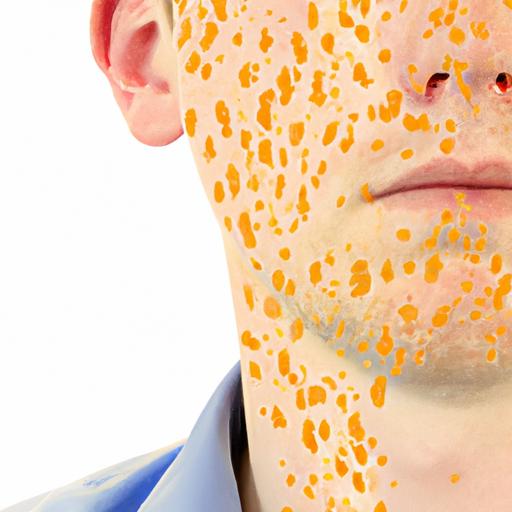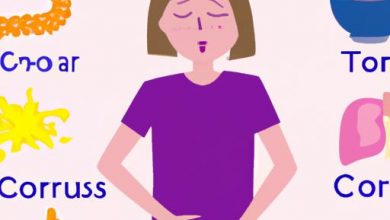Unusual Symptoms of Celiac Disease: Identifying the Signs
Celiac disease is a digestive disorder caused by an intolerance to gluten, a protein found in wheat, barley, and rye. The disease affects an estimated 1 in 100 people worldwide and can lead to serious health complications if left untreated. While common digestive symptoms like bloating, diarrhea, and constipation are well-known, there are several unusual symptoms that may indicate celiac disease. In this article, we will explore these unusual symptoms and how to identify them.
Digestive Symptoms of Celiac Disease

Digestive symptoms are the most common signs of celiac disease. These symptoms occur when the body’s immune system attacks the lining of the small intestine, damaging its ability to absorb nutrients. The severity of symptoms can vary from person to person and may not always be present in those with celiac disease. The following are some of the most common digestive symptoms of celiac disease:
Common Digestive Symptoms
- Bloating
- Diarrhea
- Constipation
- Abdominal pain
- Nausea and vomiting
Unusual Digestive Symptoms
While the above digestive symptoms are well-known, there are some unusual digestive symptoms that may indicate celiac disease. These unusual symptoms include:
- Acid reflux: This occurs when stomach acid flows back into the esophagus, causing heartburn and discomfort.
- Chronic fatigue: Those with celiac disease may experience extreme fatigue and exhaustion due to the body’s inability to absorb nutrients.
- Irritable bowel syndrome (IBS): IBS is a common digestive disorder that causes symptoms like bloating, abdominal pain, and changes in bowel movements. Research suggests that up to 10% of those with IBS may also have celiac disease.
- Unexplained weight loss: This occurs when the body is not absorbing nutrients properly, leading to unintentional weight loss.
It’s important to note that these unusual symptoms can also be present in other conditions, so it’s essential to seek medical advice if you experience any of them.
Skin Symptoms of Celiac Disease
Celiac disease can also affect the skin, causing various skin symptoms. In some cases, these symptoms may be the first sign of celiac disease. Skin symptoms occur due to the body’s immune system reacting to gluten, causing inflammation and damage to the skin cells. The following are some of the most common skin symptoms of celiac disease:
Common Skin Symptoms
- Dermatitis herpetiformis: This is a chronic skin rash that causes small, itchy blisters on the elbows, knees, and buttocks.
- Eczema: Eczema is a common skin condition that causes dry, itchy, and inflamed skin.
- Psoriasis: Psoriasis is an autoimmune skin disorder that causes thick, scaly patches on the skin.
Unusual Skin Symptoms
In addition to the above skin symptoms, there are some unusual skin symptoms that may indicate celiac disease. These unusual symptoms include:
- Alopecia areata: This is a condition that causes hair loss in small, round patches on the scalp and other parts of the body.
- Vitiligo: Vitiligo is a skin disorder that causes patches of depigmentation on the skin.
- Chronic urticaria: Chronic urticaria is a skin condition that causes hives and itching that lasts more than six weeks.
If you experience any of the above unusual skin symptoms, it’s essential to seek medical advice to rule out celiac disease.
Skin Symptoms of Celiac Disease (continued)
Apart from the common and unusual skin symptoms mentioned earlier, there are other skin symptoms that can indicate the presence of celiac disease. These symptoms include:
- Prurigo nodularis: This condition causes itchy, hard bumps to form on the skin, often on the arms and legs.
- Itchy skin: Celiac disease can cause the skin to become itchy without any visible rash or bumps.
- Cutaneous vasculitis: This skin condition causes inflammation of the blood vessels in the skin, leading to the formation of red or purple spots.
It’s essential to note that skin symptoms can also be caused by other conditions, and a proper diagnosis is necessary to determine the underlying cause.
Neurological Symptoms of Celiac Disease
Celiac disease can also affect the nervous system, leading to various neurological symptoms. These symptoms occur when the immune system attacks the nerves, leading to nerve damage and inflammation. The following are some of the most common neurological symptoms of celiac disease:
Common Neurological Symptoms
- Headaches and migraines
- Peripheral neuropathy: This condition causes numbness, tingling, or pain in the hands and feet.
- Ataxia: Ataxia is a condition that affects coordination and balance, leading to difficulty walking and performing daily tasks.
- Epilepsy: Epilepsy is a neurological disorder that causes seizures.
Unusual Neurological Symptoms
In addition to the above neurological symptoms, there are some unusual neurological symptoms that may indicate celiac disease. These unusual symptoms include:
- Anxiety and depression: Celiac disease has been linked to an increased risk of anxiety and depression, which may be due to the body’s inability to absorb nutrients properly.
- Schizophrenia: Research suggests that there may be a link between celiac disease and schizophrenia, a severe mental disorder that affects how a person thinks, feels, and behaves.
- Migrating joint pain: Celiac disease can cause joint pain that moves from one joint to another, making it challenging to diagnose.
It’s crucial to seek medical advice if you experience any of the above neurological symptoms, as they can also be caused by other conditions.
Conclusion
Celiac disease is a common digestive disorder that can lead to serious health complications if left untreated. While common digestive symptoms like bloating, diarrhea, and constipation are well-known, there are several unusual symptoms that may indicate celiac disease. These unusual symptoms include skin symptoms like alopecia areata and vitiligo, as well as neurological symptoms like ataxia and schizophrenia. If you experience any of these symptoms, it’s essential to seek medical advice to rule out celiac disease. Remember, early diagnosis and treatment are crucial for managing celiac disease and preventing long-term health complications. At Zahnweiss Info, we’re dedicated to providing the latest updates on dental health news, treatments and therapies, inspiring patient stories, and expert advice.
Psychological Symptoms of Celiac Disease
Celiac disease can also affect a person’s mental and emotional health, causing various psychological symptoms. These symptoms can be challenging to identify, as they can also be present in other conditions. However, it’s essential to recognize them to receive proper treatment. The following are some of the most common psychological symptoms of celiac disease:
Common Psychological Symptoms
- Anxiety: Those with celiac disease may experience feelings of anxiety due to the stress of managing the condition and the impact it has on their daily life.
- Depression: Depression is a common psychological symptom of celiac disease, with studies showing that up to 25% of those with celiac disease experience depression.
- Brain fog: Brain fog is a term used to describe a feeling of mental confusion or lack of clarity. Those with celiac disease may experience this symptom due to the body’s inability to absorb nutrients properly.
Unusual Psychological Symptoms
In addition to the above psychological symptoms, there are some unusual psychological symptoms that may indicate celiac disease. These unusual symptoms include:
- ADHD: Attention deficit hyperactivity disorder (ADHD) is a common neurodevelopmental disorder that affects attention, hyperactivity, and impulsivity. Research suggests that those with celiac disease may have a higher risk of developing ADHD.
- Schizophrenia: Schizophrenia is a severe mental disorder that affects a person’s ability to think, feel, and behave clearly. Studies have suggested a possible link between celiac disease and an increased risk of developing schizophrenia.
It’s essential to seek medical advice if you experience any of the above unusual psychological symptoms, as they may be indicative of an underlying condition like celiac disease.
Conclusion
Celiac disease is a serious condition that can lead to severe health complications if left untreated. While common digestive symptoms like bloating and diarrhea are well-known, there are several unusual symptoms that may indicate celiac disease. These unusual symptoms can include acid reflux, chronic fatigue, unexplained weight loss, alopecia areata, vitiligo, and chronic urticaria, among others.
It’s essential to seek medical attention if you experience any of these unusual symptoms, as they may be indicative of an underlying condition like celiac disease. The same goes for psychological symptoms like anxiety, depression, brain fog, ADHD, and schizophrenia.
If you have celiac disease, it’s crucial to follow a strict gluten-free diet to manage your symptoms and prevent complications. It’s also important to educate yourself and your loved ones about celiac disease and its potential symptoms to ensure early detection and proper treatment.
In conclusion, if you experience any unusual symptoms or have concerns about celiac disease, contact your healthcare provider or a specialist for advice. With early intervention and proper management, those with celiac disease can lead healthy and fulfilling lives.




